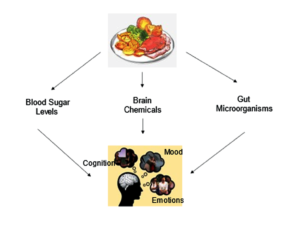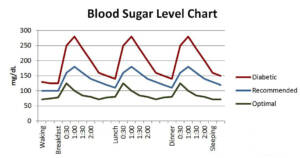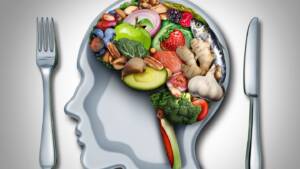Do you know what we eat influences how we think and feel?
One of the most fascinating things about eating is how various nutrients enter the brain through your blood stream affecting your mood, behaviour, and brain function. The right foods will leave you energized and increase brain functions like memory, alertness, concentration, while the wrong foods can leave you lethargic and moody.
Improving your diet may help to:
- Improve your mood
- Give you more energy
- Learn, remember & think clearly
- Be mentally alert
- Solve problems & make decisions
- Increase concentration
Just like the rest of the body, our brain also needs energy and nutrients to function effectively. Glucose is the fuel that keeps our brain awake and alert. It comes from the foods we eat. When blood sugar/ glucose gets too high or too low, it can affect our mood in many different ways. We are in full control of how we release glucose to our blood and our brains. Certain foods release glucose quickly, while others do so more slowly, yet sustainably.

After eating sugary foods and drinks we will release glucose into our blood very quickly. This rapid rise in blood sugar gives us a sudden energy boost making us excited, happy, calm and alert. Then our glucose level will drop rapidly, as glucose is removed from the blood and we feel unfocused, easily distracted, exhausted, drained of energy, looking for more food.
When blood sugar is low either due to not eating food or after eating sugar rich foods we feel anxious, annoyed, impatient, irritable, tired and hungry.
Similarly, when we eat foods made of refined carbohydrates like white bread, items made with maida, white rice and sweets there is a swing in blood sugar level. But if we eat fibre rich foods like whole grains, fruits, vegetables, pulses there is slow and steady rise and drop in blood sugar providing us long term energy and stable mood.

The brain controls the release of certain chemicals – called neurotransmitters – which communicate with other areas of the brain & the body. These neurotransmitters also influence our mood, emotions & behaviour. For e.g neurotransmitter serotonin, stabilizes mood, gives a feeling of happiness & wellbeing and also regulates sleep & appetite. Another neurotransmitter Dopamine, helps us to focus, concentrate, memorize and motivate. Neurotransmitter Acetylcholine has a role in memory, thinking, attention & learning.You would be thinking what is their relation with food. Well, all these are made from specific amino acids which we get from protein rich foods we eat. Adequate and good quality proteins i.e from animal foods milk, egg, fish, chicken is important. The vegetarian sources of protein like cereals and pulses should be eaten in right combination with one another or with the animal sources of protein.
Our gut or gastro – intestinal tract has millions of bacteria which are both good and bad. Some bacteria in excessive amounts, can cause infection and disease while other types of bacteria in right amounts help us to fight disease and stay healthy. These good bacteria are also responsible for function and production of neurotransmitters in the intestine. A balance of good and bad bacteria in the intestine is important for good immunity, better digestion and better mental health. This balance can be maintained by use of probiotics and prebiotics.
Negative effect of diet & eating habits on mood & cognitive function
- High sugar intake or intake of foods rich in refined carbohydrates cause fatigue, anxiety, aggressive behavior, depression, learning difficulty.
- Trans fats are made when liquid oils are turned into solid fats, like margarine or dalda. It is found in many fried, packaged, or processed foods, like samosa, mathi, namkeens, commercially baked cakes, biscuits etc. High trans-fat intake causes anxiety, memory problems, irritability, aggression & depression.
- Extreme low fat diets cause anxiety and depression.
- Low-carbohydrate diet causes fatigue, low energy irritability, anxiety.
- Low levels of zinc, iron, vitamin B & D magnesium, omega-3 fatty acids result in bad mood and reduced energy.
- Vit B12 deficiency causes fatigue, lethargy, poor memory &
- Alcohol at low doses, depresses brain function and give feelings of relaxation and good mood. At high dose you may experience intensified emotions, such as jealousy, anger, and depression. It causes unpredictable mood swings, decreased inhibition and a false sense of confidence.
Eating Habits & Mood
- Going long periods of time without eating makes us tired, irritable, impatient & annoyed.
- If we miss breakfast, we feel weak, tired and face difficulty in concentration.
- Overeating or consuming large meal rich in fat makes us lethargic, sleepy & sluggish.
- Not drinking enough fluid makes it difficult to concentrate and think clearly. The human body is composed of about 60% water, the human’s brain is about 75% -80 % water. When we drink less water than what is needed by the body, it leads to bad mood, tiredness, makes us irritable, reduces alertness & concentration.
Foods to Improve your mood and be happy
- Fruits & veg like banana, pineapple, strawberry, grapes, spinach, asparagus, avocado.
- Pumpkin seeds, chia seeds, almonds, cashew, peanut are rich in Mg and omega 3 fats. They prevent irritability, fatigue, mental confusion, and stress by boosting serotonin levels.
- Quinoa has quercetin which has anti-depressant effects.
- Fatty fish like salmon, herring, mackeral, sardines rich in omega 3 fats, ease anxiety & stabilize mood.
- Turmeric contains curcumin, which enhances mood. Curcumin can be absorbed better in presence of fat and freshly ground black pepper. Eating chillis can release endorphin, the happy hormone that can lift your mood.
- Dark Chocolate with > 70 % cocoa, lightens mood, cures mood swings, makes you feel both happy and stimulated. It contains phenylethylamine which makes feel good hormones.
- Caffeine in green tea improves alertness, performance, memory, and focus. Antioxidants present in it protect the brain & theanine affects serotonin and dopamine that reduces anxiety and gives calm, happy, and tranquil feeling.
To improve memory, focus & concentration eat

- Protein rich foods such as fish, poultry, meat, low fat milk & products, pulses and eggs increase the production of brain chemicals.
- Nuts like almonds and walnuts & flaxseeds have omega 3 fatty acids which are good for brain function.
- Broccoli, spinach, cauliflower & cabbage contain unique nutrients that promote healthy body and mind.
- Blueberry, strawberry, black grapes, plums, beetroot, red cabbage have anthocyanin that supports overall brain function
- Mushroom, soybean, wheat germ, kidney beans, paneer are rich in choline which makes memory-boosting brain chemical, acetylcholine.
- Dark chocolate with more than 70 % cocoa is rich in flavonoids, phenylethylamine, and caffeine. and thus, improves attention, verbal learning, and memory.
- Caffeine Found in coffee, chocolate, colas & energy drinks have both positive and adverse effects depending on the dose and frequency of intake. It energizes you, enhances attention, causes alertness, facilitates thought formation and concentration, improves memory and decreases mental fatigue. Safe limit is upto 200 mg per day i.e around 2 cups of coffee. Ingestion of higher than 400 mg can cause anxiety, nervousness, palpitation, insomnia.
Healthy habits for sustained energy and alertness throughout the day
- Don’t skip meals, especially breakfast.
- Eat small meals and snacks throughout the day instead of a few large meals.
- Eat more whole grains (whole wheat flour, dalia, bajra, jowar, oats) and fewer refined foods.
- Eat fresh whole fruit instead of fruit juice and sweetened beverages
- Include protein and fat along with carbohydrate at every meal.
- Drink 8-16 glasses of water daily to remain hydrated.
Eating for Mental & Emotional Health
Eat More – Seasonal colorful fruits & veg, fatty fish & egg, whole grains, pulses, chicken & lean meat, low fat milk & milk products, nuts & seeds, fermented foods, green tea.
Eat some – Red Meat, refined grains, dark chocolate, caffeinated drinks.
Avoid – Sweets, chips, fried foods, processed foods, sweetened beverages, colas.
Carefully select what you eat, as it has the potential to influence positively or negatively your mental, emotional and physical wellbeing.



